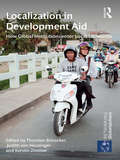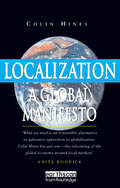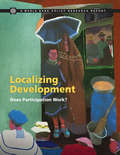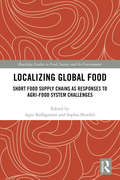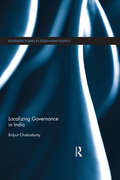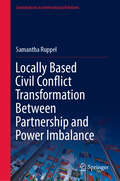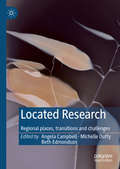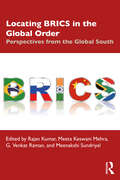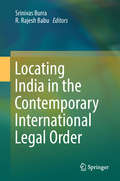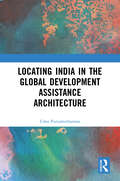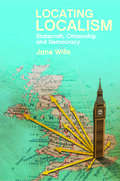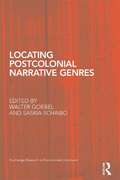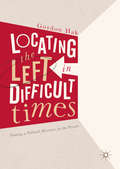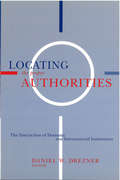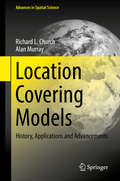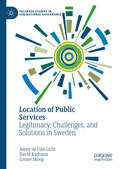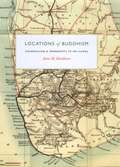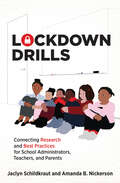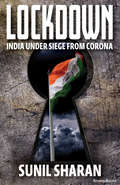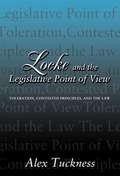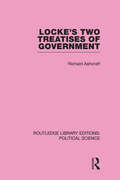- Table View
- List View
Localization in Development Aid: How Global Institutions enter Local Lifeworlds (Rethinking Globalizations)
by Thorsten Bonacker Judith Von Heusinger Kerstin ZimmerThis edited volume brings together the work of scholars from different disciplines including sociology, political science and anthropology, and analyses how global institutions are embedded in local contexts within development aid. It examines theoretical and empirical implications of the diffusion and anchoring of world polity institutions at the local and global levels. The volume furthers the understanding of the dynamics of norm negotiation and glocalization processes in culturally varied societies in an era of globalization. Themes and topics covered include: children and human rights, gender mainstreaming, multi-level actor partnerships, anti-corruption programming, local ownership, land rights and corporate social responsibility. Bringing together expert contributors, this comprehensive volume will be an invaluable resource for all scholars of localization and globalization studies, as well as those in the field of international relations.
Localization: A Global Manifesto
by Colin HinesLocalization is a manifesto to unite all those who recognize the importance of cultural, social and ecological diversity for our future - and who do not aspire to a monolithic global consumer culture. It is a passionate and persuasive polemic, challenging the claims that we have to be 'internationally competitive' to survive and describing the destructive consequences of globalization. This book is unique in going beyond simply criticizing free trade and globalization trends. It details self-reinforcing policies to create local self-sufficiency and shows clearly that there is an alternative to globalization - to protect the local, globally.
Localizing Development
by Ghazala Mansuri Vijayendra RaoThe Policy Research Report Localizing Development: Does Participation Work? brings analytical rigor to a field that has been the subject of intense debate and advocacy, and billions of dollars in development aid. It briefly reviews the history of participatory development and argues that its two modalities, community-based development and local decentralization, should be treated under the broader unifying umbrella of local development. It suggests that a distinction between organic participation (endogenous efforts by civic activists to bring about change) and induced participation (large-scale efforts to engineer participation at the local level via projects) is key, and focuses on the challenges of inducing participation. The report provides a conceptual framework for thinking about participatory development and then uses this framework to conduct a comprehensive review of the literature. The framework develops the concept of civil society failure and explains its interaction with government and market failures. It argues that participatory development, which is often viewed as a mechanism for bypassing market and government failures by harnessing civic capacity, ought to be seen instead as a mechanism that, if done right, could help to repair important civil society failures. It distills literature from anthropology, economics, sociology, and political science to outline the challenges for effective policy in this area, looking at issues such as the uncertainty of trajectories of change, the importance of context, the role of elite capture and control, the challenge of collective action, and the role of the state. The review of the evidence looks at a variety of issues: the impact of participatory projects on inclusion, civic capacity, and social cohesion; on key development outcomes, such as income, poverty, and inequality; on public service delivery; and on the quality of local public goods. It draws on the evidence to suggest several recommendations for policy, emphasizing the key role of learning-by-doing. It then reviews participatory projects funded by the World Bank and finds the majority lacking in several arenas – particularly in paying attention to context and in creating effective monitoring and evaluation systems that allow for learning.
Localizing Global Food: Short Food Supply Chains as Responses to Agri-Food System Challenges (Routledge Studies in Food, Society and the Environment)
by Agni Kalfagianni Sophia SkordiliShort food supply chains (SFSCs) rely primarily on local production and processing practices for the provision of food and are, in principle, more sustainable in social, economic and environmental terms than supply chains where production and consumption are widely separated. This book reviews and assesses recent initiatives on this topic from an interdisciplinary perspective. In theoretical terms it draws on and advances two key concepts, namely, place (particularly embeddedness in local economic networks and communities) and governance (particularly in addressing sustainability concerns in an inclusive and socially just manner). Empirically, the book examines a diverse set of SFSCs such as small-scale entrepreneurship, farmers’ markets, community supported agriculture and grassroots and solidarity networks. The main examples discussed are from Europe and North America, but the issues are applicable in a global context. The book is of interest to advanced students, researchers and professionals in food studies, sociology, geography, planning, politics and environmental studies.
Localizing Governance in India (Routledge Studies in South Asian Politics)
by Bidyut ChakrabartyParticipatory governance has a long history in India and this book traces historical-intellectual trajectories of participatory governance and how older Western discourses have influenced Indian policymakers. While colonial rulers devolved power to accommodate dissenting voices, for independent India, participatory governance was a design for democratizing governance in its true sense. Participation also acted as a vehicle for localizing governance. The author draws on both Western and non-Western theoretical treatises and the book seeks to conceptualize localizing governance also as a contextual response. It also makes the argument that despite being located in different socio-economic and political milieu, thinkers converge to appreciate localizing governance as perhaps the only reliable means to democratize governance. The book aims to confirm this argument by reference to sets of evidence from the Indian experience of localizing governance. By attempting a genealogy of participatory governance in the West and in India, and an empirical study of participatory governance in India, the book sheds light on the exchange of ideas and concepts through space and time, thus adding to the growing body of literature in the social sciences on ‘conceptual flow’. It will be of interest to political scientists and historians, in particularly those studying South Asia.
Locally Based Civil Conflict Transformation Between Partnership and Power Imbalance (Contributions to International Relations)
by Samantha RuppelThis book examines the processes and dynamics of cooperation between different actors in civil peace service projects in Kenya, Sierra Leone and Liberia. The joint handling of conflicts and peacebuilding challenges by local and international actors has a long tradition in German peace work and is becoming increasingly important in a globalized world. Therefore, the book explores the question, relevant for both academia and peace practitioners, to what extent an equal partnership can exist in the context of civil conflict transformation. By focusing on the opportunities and challenges of cooperation, the work succeeds in focusing on everyday activities, analyzing the actual processes and frictions of peace work, and making a valuable contribution to critical peace research and the discussion of hybridity and friction.
Located Research: Regional places, transitions and challenges
by Angela Campbell Beth Edmondson Michelle DuffyThis book examines the diversity of practice in regional research and its contribution to local, national and global issues. Three themes are advanced here: Place and change, Transition and resilience, and Challenges for the future. Contributors embrace frameworks of co-design and transdisciplinary practice to build communities of practice in response to lived experience in regional contexts. Their work highlights the strategic importance of a regional focus at a time when global connectivity and mobility is increasing and the complexity of ‘wicked’ problems demands more than one approach or solution. Such complex problems require nuanced, and at times ‘bespoke’ methodological approaches to better understand and support not just regional adaptation, resilience and transformation, but to manage all these things at a time when change is everywhere.
Locating BRICS in the Global Order: Perspectives from the Global South
by Rajan Kumar Meeta Keswani Mehra G. Venkat Raman Meenakshi SundriyalBRICS is conceivably the most formidable organisation to have emerged in the post-Cold War period in the non-Western world. This book highlights the significance of BRICS in a wider global context and foregrounds the long-pending demand for the reform of global governance institutions. The volume: • Traces how the organisation came into being and looks at the distinct norms and principles espoused by it • Discusses the glaring limitations of the existing institutions of global governance • Explores the economic growth and the rising political influence of BRICS states • Analyses the internal threats to the survival of the organisation and assesses its prospects in the foreseeable future. A significant intervention in situating BRICS as one of the major players in global governance, the book will be of great interest to students and scholars of international political economy, international business and finance, international relations, politics, and Global South Studies.
Locating Global Advantage: Industry Dynamics in the International Economy
by Martin Kenney Richard FloridaWhat determines where an industry will be successful today, and why.
Locating India in the Contemporary International Legal Order
by R. Rajesh Babu Srinivas BurraThis book brings together disparate views which attempt to locate India in the contemporary international legal order. The essays endeavour to explore critically India’s role and attitude towards international law in various fields and its influence and contribution in the development of the latter. The contributions are also of historical value, as they analyse the present as part of a historical trajectory. Drawing upon the current and historical practices from their respective fields, the authors attempt to highlight some critical aspects involving India and international law. These aspects broadly underline India’s drift from its traditional role as an ally and proponent of the third world towards the pragmatism of self-interest, behaviour that is often compelled by internal political and economic conditions, as well as the dictates of external forces.
Locating India in the Global Development Assistance Architecture
by Uma PurushothamanThis book explores the intricate web of global development assistance, dissecting India’s unique position within this dynamic landscape, to study the country’s evolving role in International Development. The subject matter traces India’s trajectory from its early years as a recipient of foreign aid to its emergence as a key player in providing assistance to other nations. It also examines the motivations and challenges that shape India’s engagement in the global development arena.Presenting a detailed analysis of India’s responsibilities, aspirations, and the evolving nature of global aid, this book is aimed at scholars, policymakers, and anyone seeking a broad understanding of India’s role in shaping the global development narrative.Print edition not for sale in South Asia (India, Sri Lanka, Nepal, Bangladesh, Pakistan and Bhutan)
Locating Localism: Statecraft, Citizenship and Democracy
by Jane WillsLocating localism explores the development of localism as a new mode of statecraft and its implications for the practice of citizenship. Drawing on original research, Jane Wills highlights the importance of having the civic infrastructure and capacity to facilitate the engagement of citizens in local decision making. She looks at the development of community organising, neighbourhood planning and community councils that identify and nurture the energies, talents and creativity of the population to solve their own problems and improve our world. Combining political theory with attention to political practice, the book takes the long view of this new policy development, positioning it in relation to the political geo-history of the British state. In so doing, it highlights the challenges of the state devolving itself and the importance of citizens having the freedom, incentives and institutions needed to act.
Locating Postcolonial Narrative Genres: Locating Post-colonial Narrative Genres (Routledge Research in Postcolonial Literatures)
by Walter Goebel Saskia SchabioThis volume explores how postcolonial texts have determined the evolution or emergence of specific formal innovations in narrative genres. While the prominence of questions of cultural identity in postcolonial studies has prevented due attention to concerns of literary form and aesthetics, this book gives premium to the literary, aiming to delineate the evolution of specific narrative techniques as part of an emerging postcolonial aesthetics. Essays delineate elements of an emergent postcolonial narratology across a variety of seminal generic forms, such as the epic, the novel, the short story, the autobiography, and the folk tale, focusing on genre as a powerful tool for the historicizing of literature and orature within cultural discourses. Investigating the heuristic value of concepts such as mimicry, writing back, translation, negotiation, or subversion, the book considers the value of explanatory paradigms for postcolonial generic models. It also explores the status of postcolonial comparative aesthetics versus globalization studies and liberal concepts of the transnational, taking issue with the prominence of Western concepts of identity in discussions of postcolonial literature and the favoring of mimetic forms. This volume offers a unique contribution to the study of narrative genre in postcolonial literatures and provides valuable insight into the field of postcolonial studies on the whole.
Locating the Left in Difficult Times
by Gordon HakThis book investigates notions of the individual, society, the state, economic relations and historical change that exist in the political left by drawing on contemporary philosophical, political and social thought. Using a discourse perspective, this work brings together the many fractious strains in the left, including social democracy, anarchism, communism and market socialism, and discusses them in terms of their relationships with each other. Not only does the study disentangle the left from liberal capitalism and progressive movements--such as those against racism and inequality--it sees the current left as intertwined with its history and its visions of the future.
Locating the Proper Authorities: The Interaction of Domestic and International Institutions
by Daniel W. DreznerIn an era of democratization and globalization, the number of decision makers has multiplied exponentially. Parliamentarians, bureaucrats, international secretariats, regional governors, and nongovernmental organizations have all gained influence at the expense of heads of state. How do these competing layers of authority bargain with each other to govern? International relations theorists have traditionally focused on how leaders' domestic constraints affect their bargaining position internationally. However, there has been much less work on the flip side of this question--how foreign policy leaders can use international institutions as a means of circumventing or co-opting domestic opposition. Locating the Proper Authoritiesoffers some preliminary answers, drawn from a number of theoretical perspectives by the contributors to this volume. Written by some of the most promising theorists in the field of international relations, the essays inLocating the Proper Authoritiesaddress a broad array of substantive issue areas, including humanitarian intervention, trade dispute settlement, economic development, democratic transition, and security cooperation. This broad case selection has the virtue of incorporating developing countries, which are too often ignored in international relations, as well as less well-known international organizations. Each chapter examines the mechanisms and strategies through which policy entrepreneurs use international organizations as a means of bypassing or overcoming opposition to policy change. By examining the effects of different institutional design features,Locating the Proper Authoritieshelps us understand the variety of influence mechanisms through which international institutions shape the interaction of policy initiators and ratifiers. Daniel W. Drezner is Assistant Professor of Political Science, University of Chicago.
Location Covering Models: History, Applications and Advancements (Advances in Spatial Science)
by Alan Murray Richard L. ChurchThis book provides a thoughtful and rigorous guide to coverage modeling, reviewing essential models, solution approaches, and related applications. Since the early developments of the Location Set Covering Problem and the Maximal Covering Location Problem, models based upon some form of coverage have been extended and applied in a number of areas, helping to improve services offered to citizens of large cities and regions. Examples include trauma care services, transit systems design, cell tower location, and many others. The book not only describes the strengths and weaknesses of currently available models, but also presents details on major developments, including solution procedures and applications, making it well suited both as a reference text and a textbook for graduate level courses.
Location of Public Services: Legitimacy, Challenges, and Solutions in Sweden (Palgrave Studies in Sub-National Governance)
by Jenny de Fine Licht David Karlsson Louise SkoogThis book assesses the challenges faced by local governments when deciding on the location of public services. Some physical signs of government presence are vital and generally welcomed within local communities. Schools, bus stops, care facilities, and public libraries are both crucial for the functioning and sustainability of communities, and symbolize governmental engagement. Conversely, other types of facilities are typically unwelcome. Waste and recycling stations, wind farms, and prisons often provoke protests from local residents. Drawing on evidence from Sweden, this book argues that decisions on how to locate services are inherently political, and that in order to succeed, authorities need to ensure that their policies are perceived as legitimate. It also demonstrates how the problem of locating public services is a universal issue, relevant to governments at all levels and in all countries. As urbanization and pressure on welfare systems grow, the problem of locating public services looks set to become more pressing, and the themes raised in the book are likely to remain relevant for years to come. It will appeal to researchers and practitioners in the fields of public administration and local government studies, as well as policymakers and public officials.
Locations of Buddhism: Colonialism and Modernity in Sri Lanka
by Anne M. BlackburnModernizing and colonizing forces brought nineteenth-century Sri Lankan Buddhists both challenges and opportunities. How did Buddhists deal with social and economic change; new forms of political, religious, and educational discourse; and Christianity? And how did Sri Lankan Buddhists, collaborating with other Asian Buddhists, respond to colonial rule? To answer these questions, Anne M. Blackburn focuses on the life of leading monk and educator Hikkaduve Sumangala (1827-1911) to examine more broadly Buddhist life under foreign rule. InLocations of Buddhism, Blackburn reveals that during Sri Lanka's crucial decades of deepening colonial control and modernization, there was a surprising stability in the central religious activities of Hikkaduve and the Buddhists among whom he worked. At the same time, they developed new institutions and forms of association, drawing on pre-colonial intellectual heritage as well as colonial-period technologies and discourse. Advocating a new way of studying the impact of colonialism on colonized societies, Blackburn is particularly attuned here to human experience, paying attention to the habits of thought and modes of affiliation that characterized individuals and smaller scale groups. Locations of Buddhismis a wholly original contribution to the study of Sri Lanka and the history of Buddhism more generally.
Lochner v. New York: Economic Regulation on Trial
by Paul KensLochner v. New York (1905), which pitted a conservative activist judiciary against a reform-minded legislature, remains one of the most important and most frequently cited cases in Supreme Court history. In this concise and readable guide, Paul Kens shows us why the case remains such an important marker in the ideological battles between the free market and the regulatory state.
Lockdown America
by Christian ParentiLockdown America documents the horrors and absurdities of militarized policing, prisons, a fortified border, and war on drugs. Its accessible and vivid prose makes clear the links between crime and politics in a period of gathering economic crisis.
Lockdown Drills: Connecting Research and Best Practices for School Administrators, Teachers, and Parents
by Jaclyn Schildkraut Amanda B. NickersonA comprehensive resource on what lockdown drills are, why they are necessary, and how best to conduct them.The first book to offer a comprehensive examination of lockdown drills in K–12 schools, Lockdown Drills balances research findings with practical applications and implications. Schildkraut and Nickerson, school safety experts with complementary backgrounds in criminology and school psychology, review the historical precedents for lockdown drills, distinguish school lockdowns from other emergency procedures (such as active shooter drills), explain why they are conducted, present evidence-based research on their effectiveness, and describe how to conduct them according to best practices. Proponents of lockdown drills as a life-saving necessity, the authors help to bring much-needed standardization to how these drills are studied and conducted. The authors present common arguments for and against the inclusion of lockdown drills in emergency preparedness efforts, balancing their discussion of the perceptions and psychological impacts of lockdown drills with scholarly research on the extent to which lockdown drills improve how effectively individuals respond to a potential threat. Placing lockdown drills in the larger context of school safety and preparedness, they examine the broader implications for policymakers. Finally, they emphasize that drills, of which lockdowns are only one type, are just a part of the complex school safety puzzle. Ensuring that schools are safe places for students and educators begins long before a crisis occurs and continues through the days, weeks, and years of recovery following a crisis.
Lockdown: India Under Siege from Corona
by Sunil SharanThe respected Times of India journalist reveals the truths and consequences of the country&’s unprecedented COVID-19 lockdown. On March 24, 2020, with approximately five hundred reported COVID-19 cases reported and only hours notice, India&’s Prime Minister Narendra Modi ordered the most stringent national lockdown the world has ever seen. Two months later, Modi announced the fourth phase of national lockdown with some relaxations. Now in phase five of lockdown—and as restrictions are loosened even more—all everyone knows for sure is what is unknown: What happens to the virus as India reopens? What happens to the Indian economy? And what happens to Modi? Lockdown brings you inside an event that will affect the world around us perhaps for decades to come.
Lockdown: Social Harm in the Covid-19 Era
by Daniel Briggs Justin Kotzé Anthony Lloyd Anthony Ellis Luke TelfordThis book asks whether the decision to lock down the world was justified in proportion to the potential harms and risks generated by the Covid-19 virus. Drawing on global, empirical data, it explores and exposes the social harms induced by lockdowns, many of which are 'hidden', including joblessness, mental health problems and an intensification of societal inequalities and divisions. It offers data-driven case studies on harms such as domestic violence, child abuse, the distress of being ordered to stay at home, and the numerous harms associated with the new wealth industries. It explores why some people weren't compliant with lockdown restrictions and examines the already vulnerable social groups who were disproportionally affected by lockdown including those who were locked in (care home residents), locked up (prisoners), and locked out (migrant workers, refugees). The book closes with a brief discussion on what the future might look like as we enter a post-Covid world, drawing on cutting-edge social theory.
Locke and the Legislative Point of View: Toleration, Contested Principles, and the Law
by Alex TucknessDetermining which moral principles should guide political action is a vexing question in political theory. This is especially true when faced with the "toleration paradox": believing that something is morally wrong but also believing that it is wrong to suppress it. In this book, Alex Tuckness argues that John Locke's potential contribution to this debate--what Tuckness terms the "legislative point of view"--has long been obscured by overemphasis on his doctrine of consent. Building on a line of reasoning Locke made explicit in his later writings on religious toleration, Tuckness explores the idea that we should act politically only on those moral principles that a reasonable legislator would endorse; someone, that is, who would avoid enacting measures that could be self-defeating when applied by fallible human beings. Tuckness argues that the legislative point of view has implications that go far beyond the question of religious toleration. Locke suggests an approach to political justification that is a provocative alternative to the utilitarian, contractualist, and perfectionist approaches dominating contemporary liberalism. The legislative point of view is relevant to our thinking about many types of disputed principles, Tuckness writes. He examines claims of moral wrong, invocations of the public good, and contested political roles with emphasis on the roles of legislators and judges. This book is must reading not only for students and scholars of Locke but all those interested in liberalism, toleration, and constitutional theory.
Locke's Two Treatises of Government (Routledge Library Editions: Political Science #17)
by Richard AshcraftThis volume guides the reader through a detailed examination of the text to an understanding of Locke’s political ideas in relation to his writings on philosophy, education, religion and economics and the influence these ideas had upon eighteenth-century political theorists. The author shows how Locke carefully constructed his political perspective as a defence of the principles of natural rights, constitutional government and popular resistance. He offers an original interpretation of the Two Treatises…, emphasizing the specific ways in which Locke’s political purposes in writing the work influence his discussion of such concepts as the state of nature, property, consent and tyranny. The author discusses the historical and biographical context of the work and demonstrates how eighteenth century political thinkers developed or rejected aspects of Locke’s political theory and summarizes important recent studies of Locke’s work.
